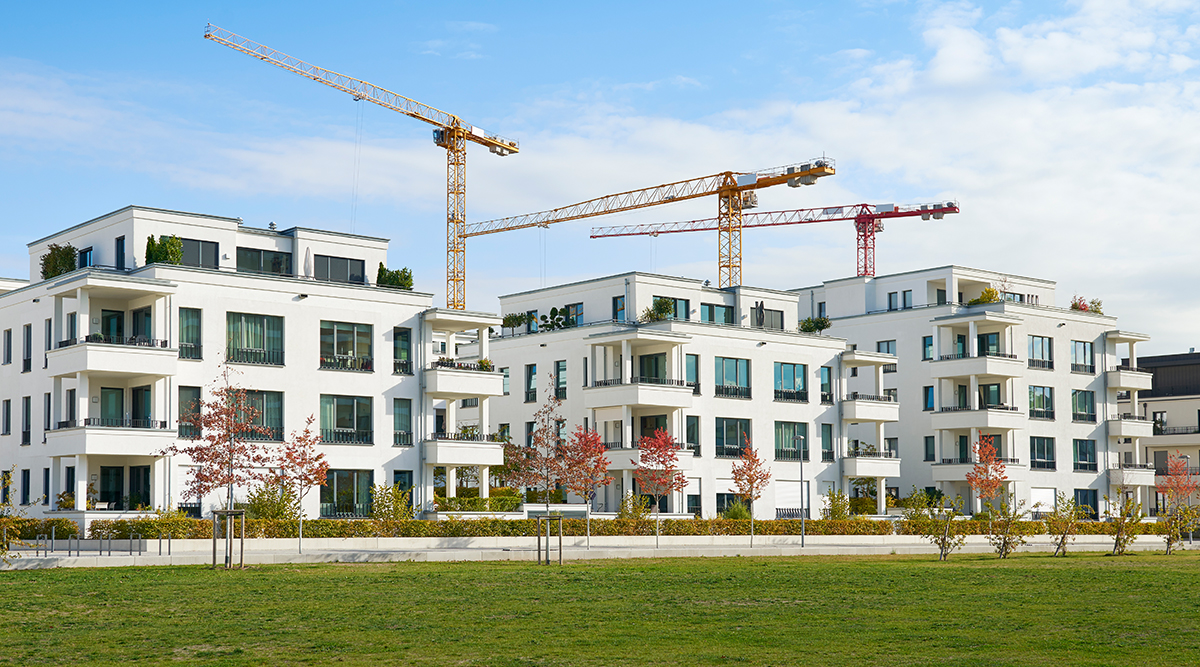As the novel coronavirus (COVID-19) continues to spread around the country, various municipalities have mandated quarantines to maintain social distancing in order to contain the virus.
This unprecedented event has virtually shut down major parts of the U.S. economy, as many people are not allowed to work or have lost their jobs altogether. The virus is likely to have multiple impacts to real estate, and although multifamily properties are often viewed as a more resilient asset class, it too will be impacted. This means that all parties involved will need to be flexible to minimize COVID-19’s effects.
While it’s too early to know the full financial ramifications of COVID-19’s spread on multifamily properties, one thing that is clear is every situation will be different.
With a whirlwind of issues facing the American public, federal, state and local governments have announced social assistance programs, including mortgage forbearance and eviction moratoriums to help multifamily property owners and tenants cope.
What Happens if Borrowers Can’t Pay Their Mortgages?
We have already seen historic increases in unemployment insurance claims as a result of COVID-19. As many people lose their jobs, some will not have the means to pay their rent.
Rents are the main source of revenue for multifamily owners, so significant decreases in rental revenues can be a major issue. Owners rely on these revenues to cover routine expenses, such as utilities, payroll and maintenance costs, and of course, to cover their mortgage payments. However, if enough tenants are delinquent on their rent payments, landlords may have a difficult time paying these expenses and obligations.
In normal circumstances, a landlord would cover lost rent with cash reserves while working to evict the non-paying tenants in the hopes of leasing the apartments to tenants who will pay their rent. However, these are not normal times. As we will discuss below, certain renter protections have been enacted to allow a deferment of rent without the risk of eviction.

In order to prevent a wave of foreclosures resulting from the current economic fallout, the Coronavirus Aid, Relief, and Economic Security Act (the “CARES Act”) provides for mortgage loan forbearance for up to 90 days to multifamily property owners who have Fannie Mae or Freddie Mac loans. To qualify for mortgage forbearance, owners must prove hardship from COVID-19, and in turn, agree to suspend evicting delinquent renters. The expansive relief given to tenants ultimately shifts the burden to landlords. These to support multifamily property owners and their tenants during these times should provide significant relief across the country as Fannie and Freddie, which are government-sponsored enterprises (GSEs), account for 49% of all multifamily loans in the U.S., according to information from the Mortgage Bankers Association. Outside of the GSEs, mortgage forbearance allowance will vary by lender and state.
If a property’s lender is not deferring or amending payments during these challenging times, the landlord may be required to come up with the cash outside of the property to make the required mortgage payments. However, the Federal Reserve has enacted policies to allow banks to borrow inexpensive, short-term debt, which may help banks cover short falls from giving relief to multifamily property owners.
What Happens if Tenants Don’t Pay Rent?
Tenants, especially those who have been furloughed or lost their jobs, may find it hard to make rent payments.
Those who have a rainy day fund may be able to make payments on time, but it is predicted that it will be difficult for many others. To address the issue of tenants losing a place to live, the federal government and municipalities around the country have adopted evictions moratoriums.
The CARES Act prevents any property owner with a Fannie Mae or Freddie Mac loan who receives a mortgage forbearance from evicting a tenant for non-payment of rent or from charging late fees during the forbearance period. Additionally, there is a 120-day moratorium on any evictions for non-paying renters by a property owner with a Fannie Mae or Freddie Mac loan or with certain other types of tenants. (It is important to note; the eviction moratorium is not a forgiveness of rent; it is a deferment for 120 days.)
Other landlords around the country are being urged to work with their tenants who have been affected by COVID-19 in some way, and many are already doing so. The National Multifamily Housing Council (NMHC) asked apartment owners and landlords to voluntarily halt evictions of renters experiencing hardships due to the virus, to pause rent increases for 90 days, and to create payment plans for residents who are unable to pay their rent. NMHC’s eviction pause does not apply for violations such as property damage, criminal activity or endangering other residents.
In addition to all of these actions, various advocacy groups and lawmakers around the country have been calling for rent freezes nationwide, so tenants won’t feel the pressure of rents while dealing with job losses during this time of uncertainty. There are also other proposals to allow renters to access their security deposits to cover rent payments.
How Else Are Multifamily Properties Affected?
With social distancing and required “stay at home” policies, prospective tenants are not able to tour properties, which has led to a slowdown in leasing activity — especially in markets hit hardest by the virus. Owners and property managers are leaning on technology as a solution to this problem by virtually showing apartments through the use of pictures and videos of rooms, amenities, and common areas.
However, the challenges of touring new apartments in person cuts both ways, as tenants who aren’t comfortable moving into a new place without visiting it in person may be more likely to renew leases, reducing turnover and improving tenant retention rates. Additionally, given these uncertain times, many tenants will choose to stay put and landlords will likely try to retain residents until the crisis and its impacts pass.
Will Multifamily Construction Sites Be Affected?
In certain areas, such as Boston, and the states of Pennsylvania and New York, construction sites were shut down, as construction outside of infrastructure, healthcare facilities and affordable housing was deemed “non-essential.”
 For the overall success of a new real estate development, project managers and general contractors try to limit and avoid delays, because large construction projects are typically financed with more expensive, shorter-term debt. However, generally every developer anticipates encountering some type of delay and therefore builds reserves and contingencies into the budget and timeline to mitigate effects of delays. We are in uncharted waters with an international pandemic causing things to change day by day, so developers will have to address each individual situation on a case by case basis.
For the overall success of a new real estate development, project managers and general contractors try to limit and avoid delays, because large construction projects are typically financed with more expensive, shorter-term debt. However, generally every developer anticipates encountering some type of delay and therefore builds reserves and contingencies into the budget and timeline to mitigate effects of delays. We are in uncharted waters with an international pandemic causing things to change day by day, so developers will have to address each individual situation on a case by case basis.
The rules for construction right now vary from place to place, and most cities have not halted construction. For now, construction in those places is ongoing and projects are proceeding as they were before. Additionally, most prohibitions on construction include carveouts that allow work to continue until the site is safe to be shut down. This will mitigate the financial risks to a project if work in progress were exposed to the elements in its current state.
One potential silver lining for developers is that construction costs may decrease. Prior to the virus developers were facing elevated construction costs because of a high volume of projects nationwide combined with a shortage of skilled labor due to record low national unemployment. It is possible that as a result of an economic downturn, new projects starts could slow and there may be more skilled labor available, which could decrease construction costs.
How Are Property Operators Managing the Crisis?
Experienced property management companies typically have plans in place for a wide variety of scenarios to make sure apartment buildings are still functioning in emergencies. While a global pandemic may not be a scenario they’ve anticipated, their general emergency plans will still be relevant.
The facility operation teams must implement best practices to control the spread of the virus within their own apartment communities. That could include sanitizing common areas frequently and reminding employees and tenants to practice proper etiquette and social distancing.
Conclusion
No one could have accurately anticipated that the global economy would slow down due to a pandemic as it has over the past few months. Lenders, borrowers, landlords, and tenants are part of an interconnected ecosystem and if one is affected, it disrupts the others. This is not the first challenge that our nation has faced, and it likely won’t be the last. However, people always need a place to live, which has contributed to the resiliency of multifamily property investment. While a complete picture of the ramifications of this virus remains to be seen and will not be known for months, various laws and programs have been put in place to try to stem some of the negative impacts, and hopefully they will lead to a quicker recovery.
